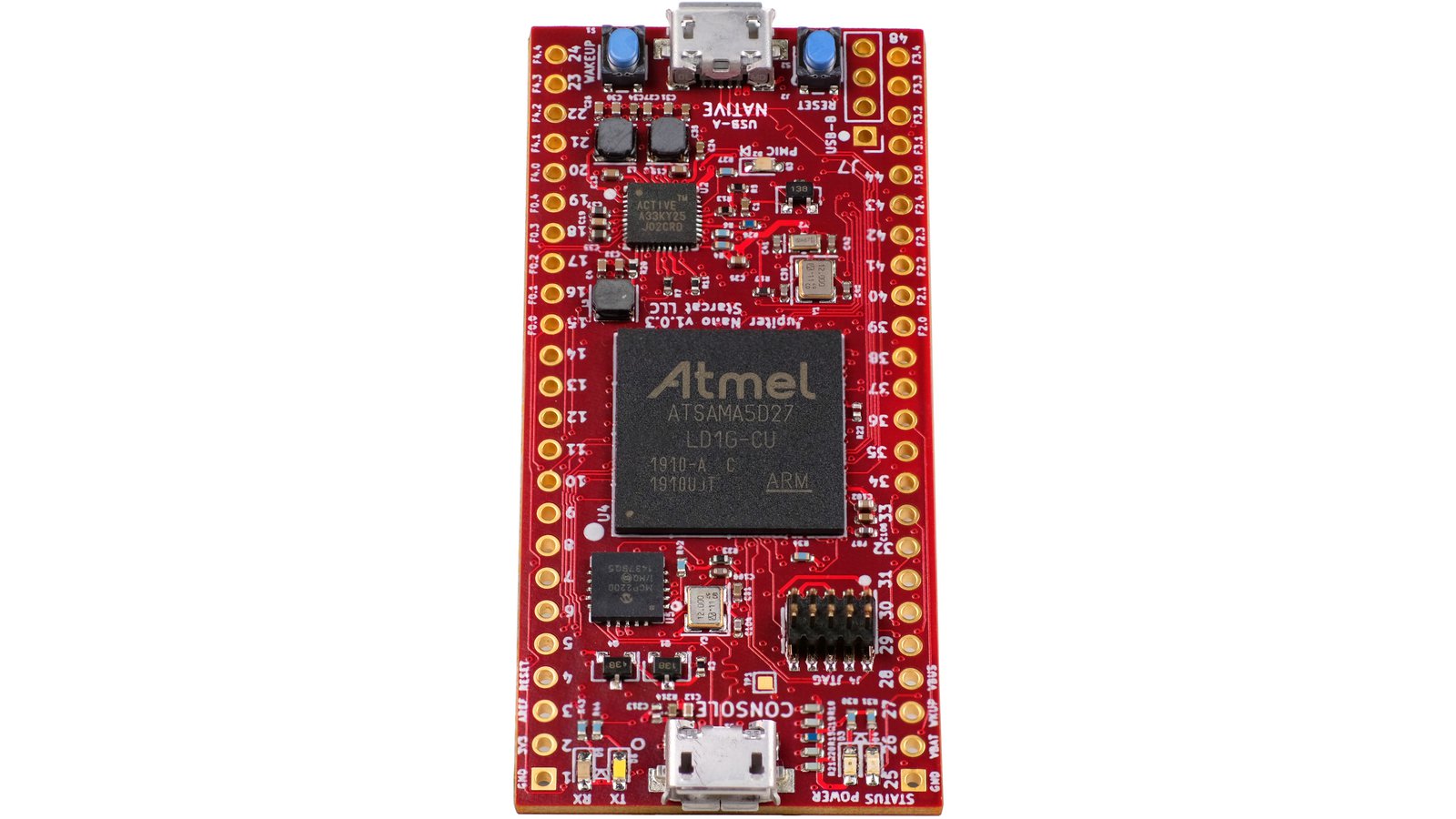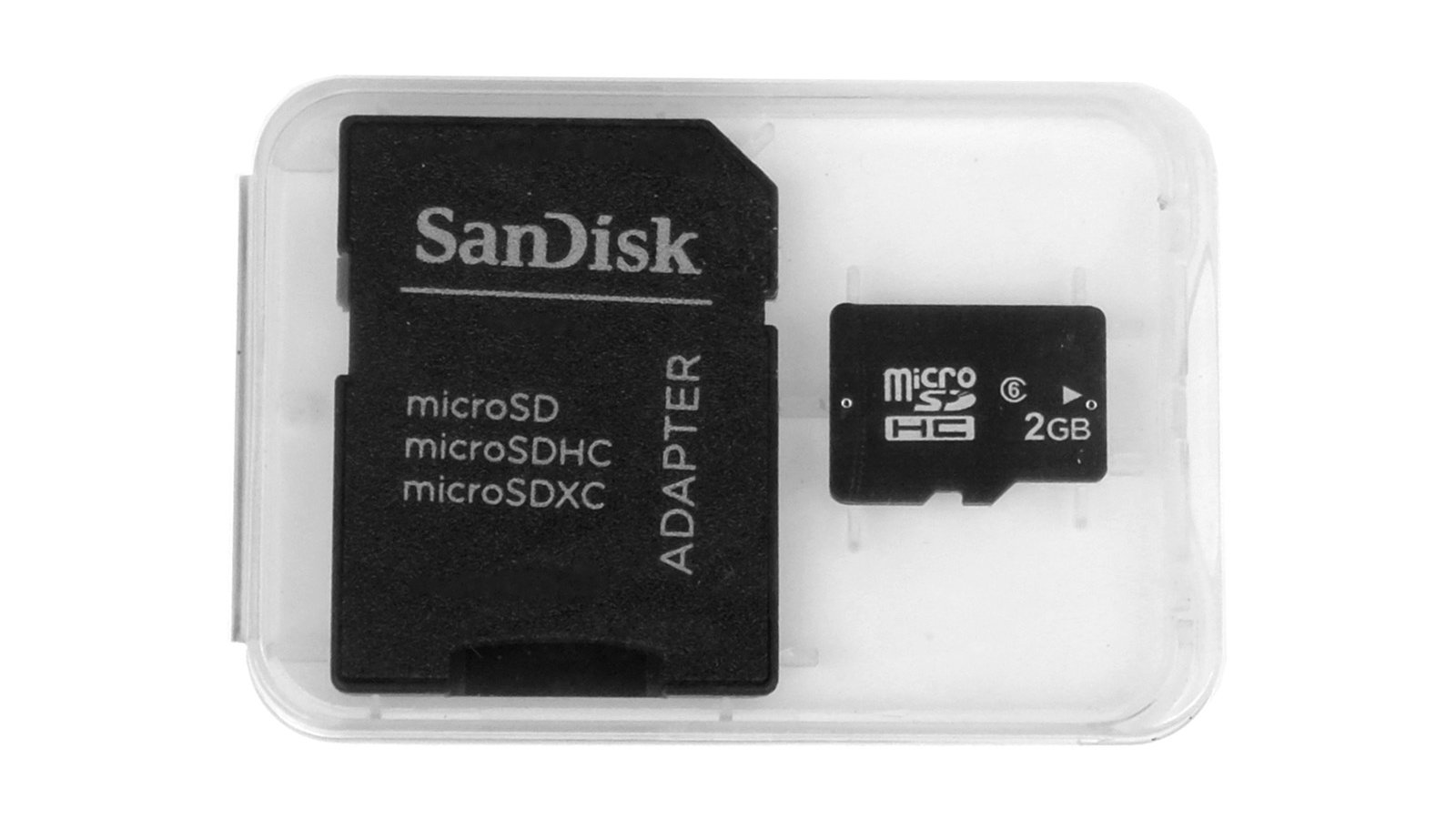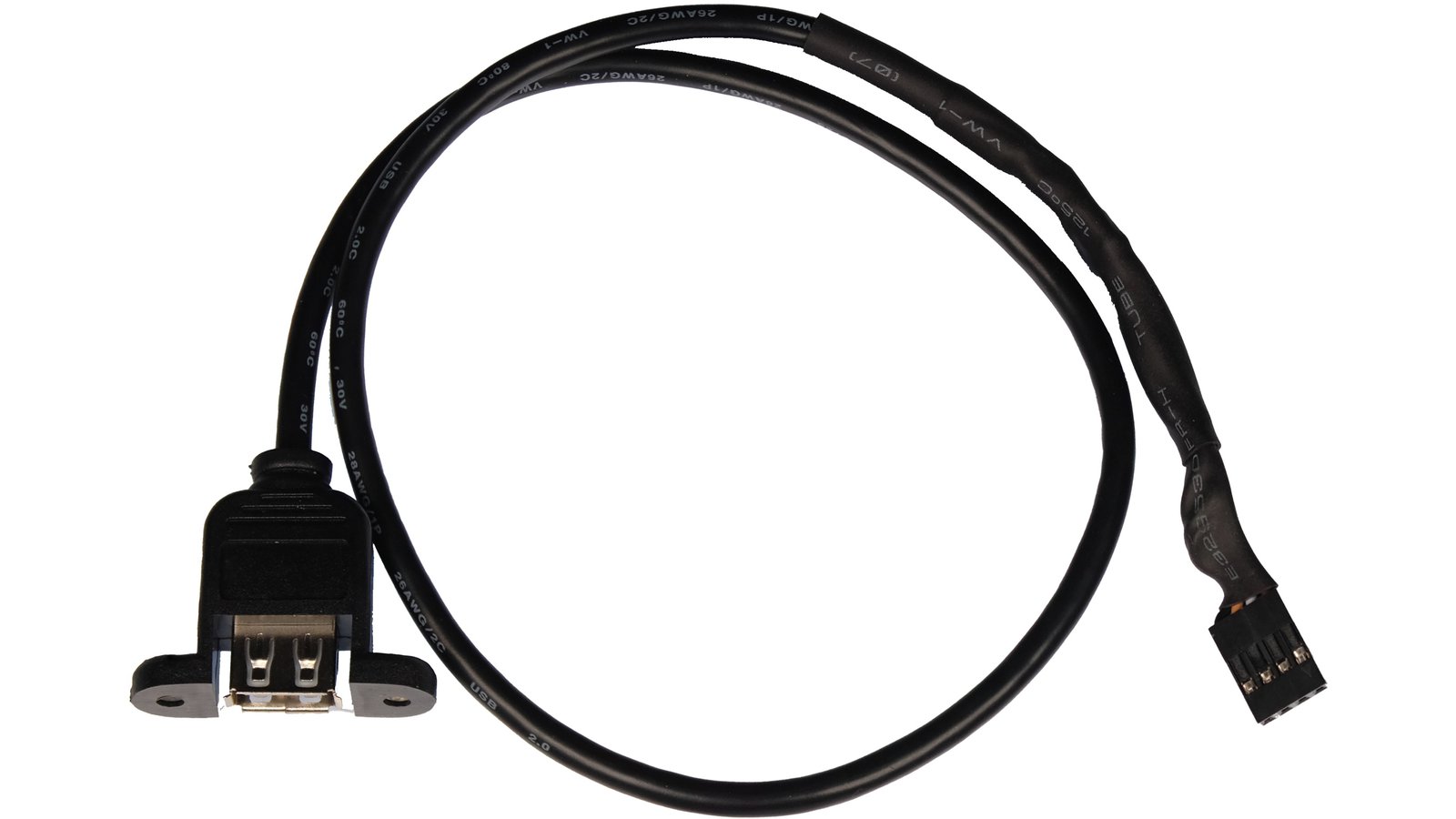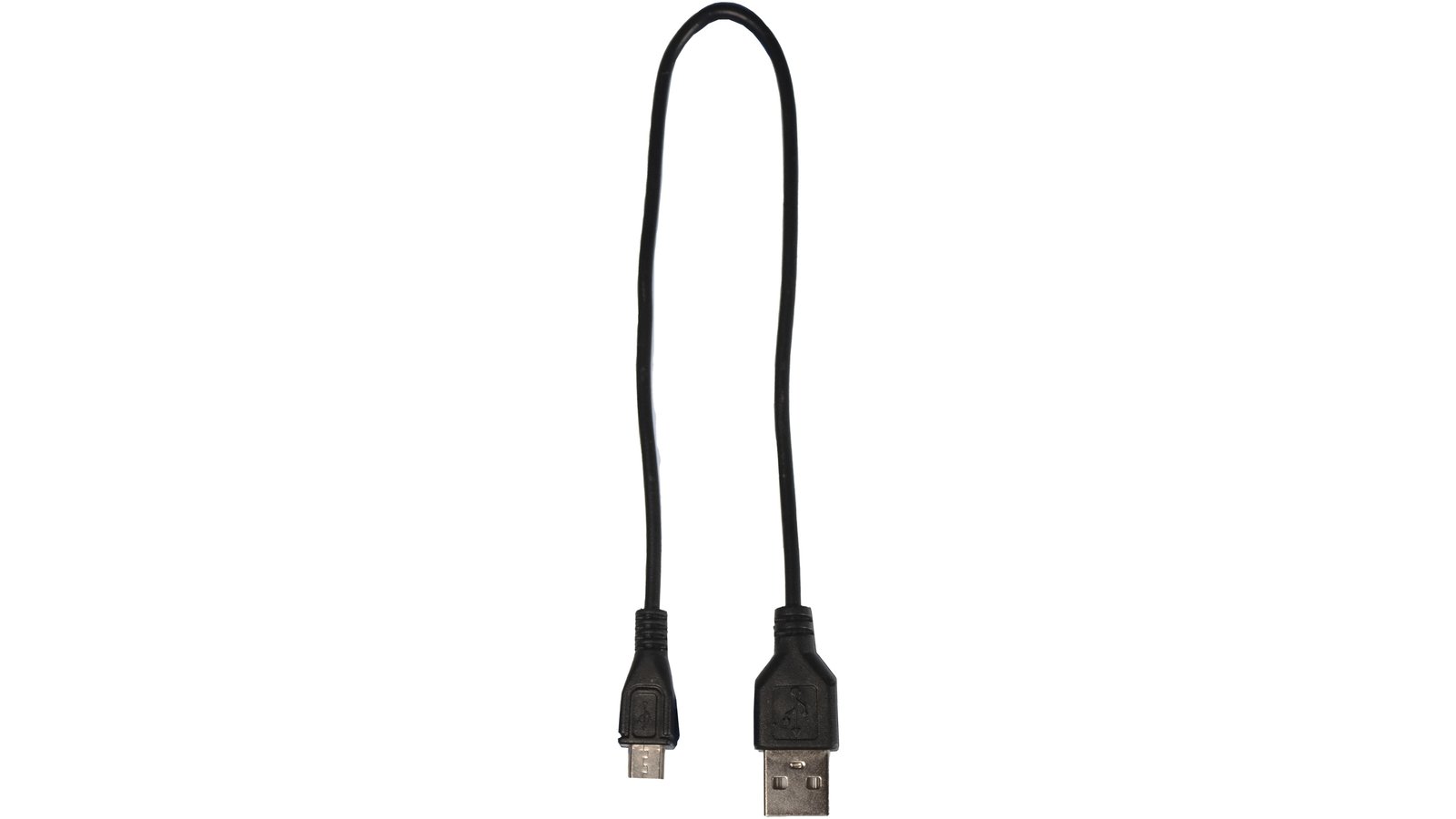Starcat
Embedded Linux Boards
Qorvo
Starcat
Embedded Linux Boards
Qorvo
Jupiter Nano is an open-hardware, ARM-based development board that runs the NuttX RTOS or Linux. It has a tiny, 48-pin form factor—similar in size to the Teensy 4.1, at 2.86 x 6.35 cm (1.125 x 2.5 in)—and its SAMA5D27C-LD1G microprocessor is 10x more powerful than the Arduino Due.
Jupiter Nano is perfect for Arduino users who need a tiny, powerful computer with a fast CPU, plenty of RAM, an Internet-connected real time operating system (NuttX), or all of the above. It should also be attractive to Linux users who need a small, open-hardware computer with lots of I/O and support for high-speed networking. A board this small and this powerful is suitable for a nearly endless list of possible applications.
Massive, fast storage: microSD cards with up to 1 TB (a terabyte!) of storage are available these days, as are special-purpose microSD cards that allow you to write data at high speeds. And because Jupiter Nano boots from its microSD card, it can’t be "bricked" (stuck in an unbootable, unfixable state). If something bad happens to the contents of your microSD card, all you have to do is reformat it and try again.
Lots of sensor or device connections: Jupiter Nano is a capable robot controller with the following interfaces: 5 SPI, 5 TWI, 4 USART, 1 CAN, and 1 I²SC. The USARTs can handle the RS-232, RS-485, and LIN protocols. This is made possible by the SAMA5D27C’s special Flexcom peripherals which can be individually configured to do any of these jobs. Jupiter Nano also uses DMA so its processor doesn’t have to do a lot of work to get data into or out of the chip.
Motors, audio, and lighting: If you need to control motors or lighting directly, there are 6 PWM outputs for that purpose. The I²SC interface can drive digital audio amplifiers, and there is one channel of Class D amplified PWM audio capable of driving an analog amplifier directly. Five 12-bit analog-to-digital converter (ADC) channels will help you digitize analog signals or analog audio. So if you’ve got sensors, screens, sound systems, or motor controllers to talk to, this tiny board has you covered.
Built-in development interfaces: Jupiter Nano has an on-board USB-to-UART converter, so you can just connect a USB cable to log in to the main console or read system logs and error messages. It has a mini-JTAG connector as well, so you can plug in a hardware debugger – essential for getting to the bottom of subtle bugs.
Encryption: Finally, Jupiter Nano includes dedicated crypto hardware, to handle intensive encryption operations, and a true random number generator (TRNG) that allows it to create stronger encryption keys.
Despite its diminutive size, Jupiter Nano is suitable for a huge variety of applications. It has what you need if you’re looking for:
| Jupiter Nano | Teensy 4.1 | Raspberry Pi Zero W | Raspberry Pi Pico | Arduino Nano | |
|---|---|---|---|---|---|
| Manufacturer | Starcat | PJRC | Raspberry Pi Foundation | Raspberry Pi Foundation | Arduino |
| CPU architecture | ARM | ARM | ARM | ARM | AVR |
| CPU | SAMA5D27C-LD1G | i.MX RT1060 | BCM2835 | RP2040 | ATMega328 |
| Open Source | HW+SW | SW | SW | SW | HW+SW |
| Runs NuttX RTOS | Yes | No | No | No | No |
| RAM | 128 MB | 1 MB | 512 MB | 264 KB | 2 KB |
| LiPo battery charger | Yes | No | No | No | No |
| TCP/IP stack | Yes (Linux and NuttX RTOS) | No | Yes | No | No |
| Dedicated USB Console | Yes | No | No | No | Yes |
| USB interface | 2x USB 2.0 High Speed, 1x USB 2.0 Full Speed | 2x USB 2.0 High Speed | 1x USB 2.0 High Speed | 1x USB Full Speed | 1x USB Full Speed |
| Flash | SD card | 8 MB | SD card | 2 MB | 32 KB |
| Clock Speed | 498 MHz | 600 Mhz | 1 GHz | 133 MHz | 16 Mhz |
| SD card slot | Yes | Yes | Yes | No | No |
| Total pins | 48 | 42 | 40 | 40 | 30 |
| I/O pins | 41 | 36 | 28 | 28 | 24 |
| Runs Linux | Yes | No | Yes | No | No |
| Runs MicroPython | Yes | Yes | No | Yes | No |
| Runs Arduino API | No | Yes | No | No | Yes |
| SPI ports | 6 | 3 | 2 | 2 | 1 |
| I²C ports | 5 | 3 | 2 | 2 | 1 |
| USARTs | 4 | 8 | 0 | 1 | 1 |
| I²S port | 1 | 1 | 0 | 0 | 0 |
| CAN bus ports | 1 | 3 | 0 | 0 | 0 |
| ADC pins | 5 | 18 | 0 | 4 | 8 |
| PWM pins | 6 | 35 | 0 | 0 | 0 |
| Wi-Fi | External ¹ | No | Yes | No | No |
| Debugging connector | JTAG | No | No | SWD | No |
¹ Via Raspberry Pi Zero W acting as a Wi-Fi adapter
The Jupiter Nano hardware design files, in KiCAD format, and various software tools, including scripts to build U-Boot, Linux, and a Debian Linux file system, are all available on GitHub. If you have a question, please get in touch.
Produced by Starcat in Seattle, WA.
Sold and shipped by Crowd Supply.

High-performance SAMA5D27C-LD1G development board that runs Linux or NuttX

A 2 GB microSD card, pre-loaded with NuttX or Linux, ready to boot your Jupiter Nano

Native USB Port B Panel mount cable - Female USB Type-A to female IDC header connector

A Micro-USB to USB Type-A cable chosen for the fit of its connector housing